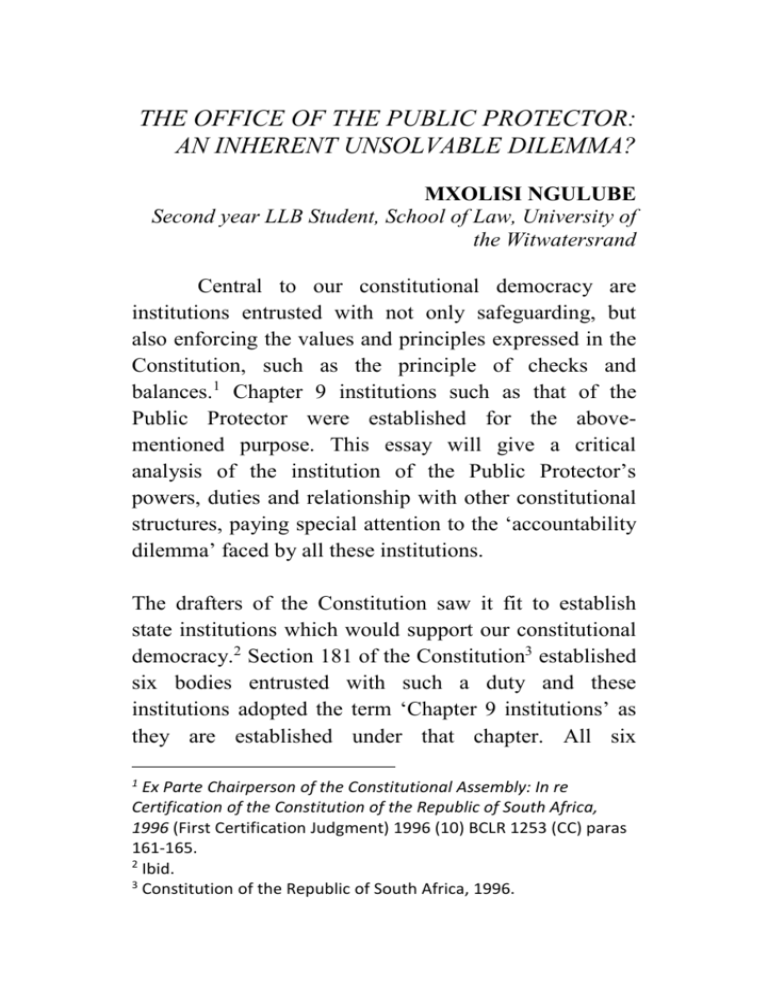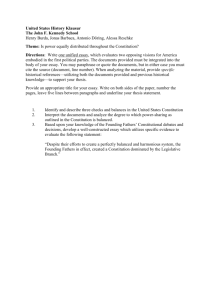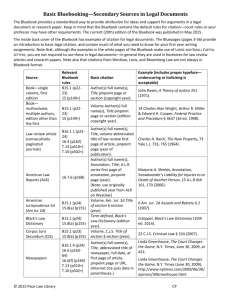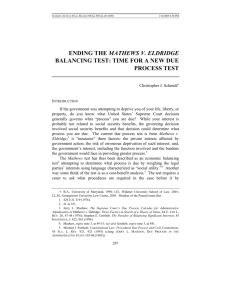2016_Inkundla_5
advertisement

THE OFFICE OF THE PUBLIC PROTECTOR: AN INHERENT UNSOLVABLE DILEMMA? MXOLISI NGULUBE Second year LLB Student, School of Law, University of the Witwatersrand Central to our constitutional democracy are institutions entrusted with not only safeguarding, but also enforcing the values and principles expressed in the Constitution, such as the principle of checks and balances.1 Chapter 9 institutions such as that of the Public Protector were established for the abovementioned purpose. This essay will give a critical analysis of the institution of the Public Protector’s powers, duties and relationship with other constitutional structures, paying special attention to the ‘accountability dilemma’ faced by all these institutions. The drafters of the Constitution saw it fit to establish state institutions which would support our constitutional democracy.2 Section 181 of the Constitution3 established six bodies entrusted with such a duty and these institutions adopted the term ‘Chapter 9 institutions’ as they are established under that chapter. All six 1 Ex Parte Chairperson of the Constitutional Assembly: In re Certification of the Constitution of the Republic of South Africa, 1996 (First Certification Judgment) 1996 (10) BCLR 1253 (CC) paras 161-165. 2 Ibid. 3 Constitution of the Republic of South Africa, 1996. MXOLISI NGULUBE institutions serve different mandates; however, they all act as mechanisms for checks and balances of our democracy, either directly or indirectly. Some such as the Human Rights Commission4 and Commission for Gender Equality have duties that may overlap as they are both concerned with curbing discrimination5, while others such as the Auditor General6 and the Public Protector (‘the PP’)7 concern themselves with scrutinising the government’s behaviour. In one form or other they are all ‘watchdogs’ of the state, be it directly or indirectly.8 These institutions can be said to be an extension of the doctrine of separation of powers as they ensure that two of the arms of government, the legislature and executive do not abuse their powers.9 However, they are not a branch of government, as they are independent.10 These institutions assist in ensuring that the doctrine is implemented successfully. The PP is but one of these institutions, founded under section181 and given ‘teeth’ under section182 of the Constitution as well as by the Public Protector Act.11 The 4 Supra note 3 s184(1)(a-c). Ibid s187. 6 Ibid s188. 7 Ibid s182. 8 Briefing Paper 287: The Chapter 9 institutions in South Africa (2012) 1. 9 C Murray ‘The human rights commission et al: What is the role of South Africa’s Chapter 9 institutions?’ (2006) 9 PER/PELJ 124. 10 Supra note 3 s181(2). 11 23 of 1994. 5 MXOLISI NGULUBE PP’s duties include but are not limited to those mentioned in section182(1) of the Constitution such as investigating conduct of government at all levels, including the executive and the legislature, for any inappropriate behaviour or conduct; and compiling reports on such conduct.12 Furthermore, the duties also arise from other statutory provisions such as the Executive Members Ethics Act13, which gives the PP the power to investigate any unethical behaviour such as bribery.14 Furthermore, the Public Protector Act15 elaborates on and reiterates the PP’s powers as stipulated by the Constitution. The PP’s authority extends to investigating companies that are parastatals such as Eskom and Telkom. Other statutes established with the aim of combating corruption within government such as the Prevention and Combating of Corrupt Activities Act16 also confer duties on the PP. Duties such as advising a complainant of alternative remedies and summoning witnesses also fall within the scope of the PP’s duties.17 Moreover, investigating ‘abuse of power’, ‘breach of trust’ and ‘violation of legal duties’ are duties the PP may perform.18 The PP ultimately serves as the government watchdog. 12 Supra note 10 s7. 82 of 1998. 14 Ibid s2(2)(a)(iv). 15 Supra note 11. 16 12 of 2004. 17 Supra note 11 s6(4)(d)(ii). 18 Supra note 16 s3(b)(ii)(aa-cc). 13 MXOLISI NGULUBE The powers of the office of the PP include taking the required remedial actions as well ‘mediation and negotiating’.19 However, the powers of the PP are not without limitations. The PP’s powers extend only to the legislature and the executive, the PP’s office has no jurisdiction and authority over the judiciary and thus she cannot investigate court decisions or the courts’ conduct.20 The judiciary, like the PP is independent and impartial. Therefore, the office of the PP cannot interfere with this independence21. Furthermore, the PP cannot investigate the conduct of private citizens since there are other institutions that investigate improper conduct of private persons such as the police and SARS. The PP’s investigations are documented and she has the power to make recommendations on her findings.22 These recommendations have the force of law and thus they cannot simply be ignored. The controversial Nkandla report23 serves as an illustration of how serious the recommendations are since an ad hoc committee has been assembled to decide what actions to take based on the report. Furthermore, the Nkandla report serves as an illustration that if implicated individuals are not satisfied 19 Supra note 16 s3(b)(ii)(aa-cc).. Supra note 3 s182(3). 21 Van Rooyen and others v S and others 2002 (8) BCLR 810 (CC). 22 Supra note 11 s8(1). 23 Glynnis Underhill ‘Madonsela: Nkandla defenders don’t understand the law’ Mail & Guardian 24 April 2014 para 2. 20 MXOLISI NGULUBE with the findings, they may resort to challenging the PP’s report in a court of law.24 Like all Chapter 9 institutions, the PP enjoys complete independence and impartiality. Chapter 9 institutions are afforded the same independence as that of the courts in section 165(2) of the Constitution. Both certification judgments of the Constitution ensured that independence and impartiality were guaranteed by the Constitution and the court went further to discuss the importance of this.25 The independence and impartiality of all the institutions, the PP included, is stressed in section 181(2) of the Constitution and like the courts, these institutions must fulfill their mandates without ‘fear or favour’. However, at the very same time, the PP along with the other Chapter 9 institutions is accountable to the National Assembly which forms part of the legislative branch of government.26 This results in a dilemma; a struggle ensues between this office’s independence and impartiality; and its accountability to the National Assembly. The fact that both sides of the struggle have backing in the Constitution does nothing to better this 24 Pierre De Vos ‘Elections: how can we level the playing field’ available at http://constitutionallyspeaking.co.za/elections-howcan-we-level-the-playing-field/ ,accessed on 24 April 2014. 25 Supra note 1; Certification of the Amendment Text of the Constitution of the Republic of South Africa, 1996 (Second certification judgment) 1997 (2) SA 97 (CC) paras 128-134. 26 Supra note 3 s181(5). MXOLISI NGULUBE dilemma.27 This dilemma arises due to a number of reasons. Firstly, neither the Constitution nor the Public Protector Act28 clarifies to what extent the PP is accountable and what exactly this accountability entails. Accountability to the National Assembly puts the PP’s office’s independence and impartiality at risk, which in turn affects the office’s functioning as well as its credibility.29 Because the PP accounts to Parliament, one can argue that Parliament may block her investigations on political bases rather than constitutional ones, which is in direct contrast to the ability to function independently. Furthermore, the PP is funded by the National Assembly and money is central to the survival of such an institution, thus placing the achievement of financial wellbeing of this institution on one of the bodies it investigates and therefore forcing it to be dependent on the National Assembly - after all you cannot bite the hand that feeds you. The dilemma is further fuelled by the fact that the Constitution places a duty on other organs of state to assist in promoting the independence of this institution.30 27 Pierre de Vos ‘Balancing independence and accountability: The role of Chapter 9 Institutions in South Africa’s constitutional democracy’ available at http://www.academia.edu/3005430/Balancing_Independence_and _Accountability_The_Role_of_of_Chapter_9_Institutions_in_South_ Africas_Constitutional_Democracy, accessed on 10 April 2014. 28 Supra note 11. 29 Ibid. 30 Supra note 3 s181(3). MXOLISI NGULUBE The question is how organs of state such as Parliament promote the independence of this office while at the same time trying to hold this office accountable. The balance between independence and impartiality on the one hand and accountability on the other is a very difficult one to strike, and the survival and effectiveness of institutions such as that of the PP is dependent on this balance. Our constitutional democracy is also ultimately dependent on this balance which is seemingly impossible to achieve. However, if one thing is clear it is that Chapter 9 institutions can only go about fulfilling their constitutional mandates when their independence is guaranteed and protected. Furthermore, these institutions are also deserving of the support of private citizens in order for them to continue safeguarding our young constitutional democracy as they have over the past 20 years.











